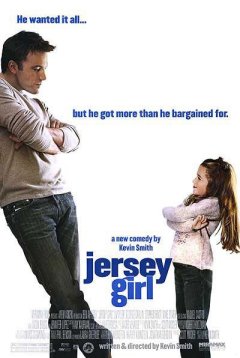|
Jersey
Girl
With
a track consisting of the bomb that was Mallrats, the
indie uphill battle for Chasing Amy, the Catholic League
protested Dogma, and the fan-centric Jay
and Silent Bob Strike Back, it seems that Kevin Smith
may never be able to release a film without facing some form
of public spectacle.
Consider
his latest film, Jersey Girl. First it was minor skepticisms
surrounding a quieted shift in release date to avoid pitting
the jersey shore family drama up against the third and final
film in The Matrix trilogy. At the time this seemed like a
wise move, but I wonder if Smith would opt to open his meager
drama piece against the sci-fi behemoth as originally planned
if he were given the opportunity.
Hindsight
is always favorable, and the "Wachowski Paycheck"
looked to be the biggest obstacle on the radar for Smith.
That is until the aftermath of hurricane Bennifer and the
a-bomb that was the failure of Gigli
sucked all interest out of the two performers, and left Smith
back at square one with a film that seemed less desirable
than a sequel to Carrot Top's debut film Chairman of the
Board.
Suddenly
his decision to "step away" from his "Askewniverse"
and let his two staple characters, Jay and Silent Bob, sit
out this venture into a more sentimental exploration of relationships
looked like it might prove Smith's downfall. Or maybe not.
One look
at Rotten
Tomatoes will attest that the critical onslaught has
successfully detracted from the film to the point of reducing
it to nothing more than schlock clichéd trite. So much
has been made of its supposed predictability and hackneyed
portrayal of single parenthood that the film would appear
to be destined for failure.
That's
sad, because Smith has carved out a message in Jersey Girl
that is so refreshingly real and unique that it deserves to
be seen even if it isn't the greatest cinematic achievement
in film history. Besides, this film was never intended for
spectacle. Contrivances aside, the point here is less about
where and how the characters end up physically as it is concerned
with where and how they land emotionally.
Affleck's
Ollie Trinke is a single father forced to raise his daughter
after his wife Gertie (Lopez) dies during childbirth. Had
the film been released at a different time, the impact of
this moment would have been devastating, but now Smith has
to battle publicly just to get viewers and critics to embrace
these two as characters, not as former power couple Ben Affleck
and Jennifer Lopez.
Smith
employs some tried and true tropes that we've all seen before
to accomplish his means, yet he does so in a fashion meant
to drive the characters because these things happen to real
people. Smith makes these moments his own, redefining them
in memorable ways enough to set them aside from previous visitations
in lesser films.
Things
work out for the Trinke clan, but not before Ollie learns
a lesson that reaches far deeper than the typical romantic
comedy denouement. This is due, in part, to the fact that
these characters have depth beyond their typical counterparts.
Ollie's relationship with his daughter Gertie is completely
believable, due in part to Affleck's willingness to open up
emotionally while at the same time applying some of the wit
(with help from Smith's dialogue and humor) and charm that
made him famous to begin with.
Raquel
Castro is a fine find as far as child actors are concerned.
Don't let the chin tapping images from the TV spots fool you,
she comes across as your typical seven year old, eager to
understand the adult world, willing to say whatever comes
to mind, and unrelenting when eying hypocrisy. Their bond
is authentic and never stoops to typical childlike cuteness.
The real
accolades should go to Liv Tyler and George Carlin. Liv excels
as Maya, a Kevin Smith dream girl who starkly resembles his
own wife, Jennifer Schwalbach-Smith (who herself cameos).
Liv is very free and open in the role, not stiff, rigid, or
even uncomfortable, as she has appeared in previous films.
Carlin in the same regard is phenomenal as Ollie's father
Bart. He is natural, curt, and surprisingly sympathetic in
a role that, like Liv's, is usually reserved for two dimensional
character developments in films such as these. Instead we
are treated to real developments that do not feel forced or
undeserved.
For years
Smith has been haggard by critics over his visual style, or
better yet, lack thereof. Jersey Girl is a very obvious
attempt by Kevin to step up his role as a director, and this
is not a wasted effort. Under the tutelage of Oscar winning
cinematographer Vilmos Zsigmond, Kevin's latest is a startling
contrast to his other films.
This is
not to say that Smith has found his voice visually. He has
always had a discernable style when it comes to his writing,
but he still lacks a distinct aesthetic style that defines
his films (other than the aforementioned lack of visual style).
Jersey Girl is a step in the right direction, but I
still look forward to seeing him develop a design all his
own to match his prowess with the written word.
As far
as fanboy response is concerned, whether critics like to admit
it or not, Jersey Girl is pure Smith. All of the elements
are there, snappy dialogue, heartfelt sentiment, and the grade
school obsession with sexual innuendo. These all flourish
in the film to surprising results despite its rating.
Ignore
the claims of overt use of saccharine sentiment, clichéd
predictability, and just open up to the film instead. You'll
find that the real shock here is how good it actually is underneath
all the negative hype.
Rating:

|








